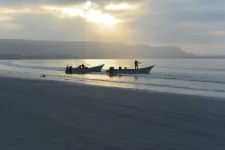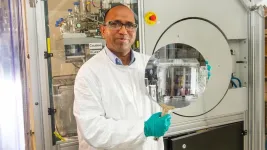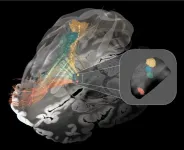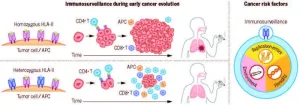(Press-News.org) BEAUFORT, N.C. – When it comes to protecting a crucial resource in the face of changing conditions, it’s important to know how the humans reliant on that resource have organized themselves. Especially if there isn’t a lot of government supervision.
A new study of small-scale fisheries in Mexico’s Gulf of California has found that the fishers’ response to a changing climate can be strongly influenced by what they fish for and how they’re organized. The work appears in the January 2024 issue of Global Environmental Change.
“When we study climate change adaptation, we haven't paid nearly enough attention to how those fishers, these farmers, these water irrigators are organized,” said Xavier Basurto, the Truman and Nellie Semans/Alex Brown & Sons Professor of sustainability science at the Duke Marine Lab and senior Co-Principal Investigator of this research project.
Their organization, or self-governance, turns out to be key.
“We see that, depending on how they're organized, they are better able to adapt to climate change, but it comes with tradeoffs,” Basurto said.
Using ten years of fisheries data from the Mexican government, the researchers observed a natural experiment in which the sea was unusually cool from 2006 to 2011, and then unusually warm from 2012 to 2016. They looked at four kinds of fishing organization across eight different regions surrounding the gulf.
Rather than having satellite data and sophisticated models to monitor changing conditions, the Gulf of California fishers have “a very intimate knowledge of the environment because they're interacting with it every day,” Basurto said. “They're very, very good at reading the landscape or the environment, because their success as fishers depends on that. They see changes that they haven't seen in their lives and that their elders haven't told them about.”
One of the main findings shows that large cooperative fishing organizations specialized or focused specifically on just a few key high-value species like shrimp, lobster, or abalone, were more likely to adapt their practices to minor changes in conditions and to practice conservation measures, Basurto said. However, their degree of specialization on a few harvested species constrained their ability to adapt to larger climatic fluctuations.
In contrast, the smaller cooperatives and independent fishers harvested a broader variety of species and were found to be less likely to change their practices as conditions changed. However, the smaller operators are also more likely to withstand larger climatic fluctuations because they harvest a more diverse portfolio of species.
In these remote villages along Mexico’s Gulf of California, there isn’t a lot of government oversight or policy-setting either.
“Climate variability and change in ocean ecosystems create challenges for fisheries’ sustainability, both economically and environmentally,” said Timothy Frawley, the first author on the paper and a postdoctoral researcher affiliated with the University of Maine Darling Marine Center.
“While we know quite a bit about how individual fishers and coastal fishing communities are responding to changing oceans, less is known about how the social structures through which they choose to organize themselves may influence their vulnerability to associated shocks and stressors and their capacity to adapt,” Frawley said.
This study is part of MAREA+, a long-term interdisciplinary project led by Duke University focused on the environmental and human dimensions of small-scale fisheries in the Gulf of California region.
“It is really exciting to see how fine-scale information on fishing organizations can illuminate our understanding of responses to climate impacts,” said Heather Leslie, a MAREA+ Co-principal investigator and professor of marine sciences at the University of Maine. “It would be great to be able to do this type of analysis in New England, particularly given the growing interest in innovative approaches to fisheries, aquaculture and other dimensions of the blue economy.”
This research was funded by the U.S. National Science Foundation. The team included scholars from University of California Santa Cruz, NOAA’s Southwest Fisheries Science Center, the University of Maine, Stanford University, Stockholm University, University of Rhode Island, Oregon State University, Universidad Autónoma de Baja California, Scripps Institution of Oceanography and the Mexican civil society organizations Sociedad de Historia Natural Niparajá, and Comunidad y Biodiversidad (COBI).
CITATION: “Self-Governance Mediates Small-Scale Fishing Strategies, Vulnerability and Adaptive Response,” Timothy H. Frawley, Blanca González Mon, Mateja Nenadovic, Fiona Gladstone, Keiko Nomura, José Alberto Zepeda-Domínguez, Salvador Rodriguez-Van Dyck, Erica M. Ferrer, Jorge Torre, Fiorenza Micheli, Heather M. Leslie, Xavier Basurto. Global Environmental Change, Jan. 2024. DOI: 10.1016/j.gloenvcha.2024.102805
END
Study shows how local fishers respond to climate challenges
Large cooperatives adopt conservation measures for shifting climate conditions, even without government oversight
2024-02-22
ELSE PRESS RELEASES FROM THIS DATE:
Cooler, wetter parts of Pacific Northwest likely to see more fires, new simulations predict
2024-02-22
CORVALLIS, Ore. – Forests in the coolest, wettest parts of the western Pacific Northwest are likely to see the biggest increases in burn probability, fire size and number of blazes as the climate continues to get warmer and drier, according to new modeling led by an Oregon State University scientist.
Understanding how fire regimes may change under future climate scenarios is critical for developing adaptation strategies, said the study’s lead author, Alex Dye.
Findings were published today in JGR Biogeosciences.
Dye, ...
U.S. Department of Energy awards Argonne National Laboratory $4 million for energy-efficient microchip research
2024-02-22
While the microchips inside electronic devices like cell phones and computers are incredibly small, transistors — the tiny electrical switches inside of microchips — are approaching the atomic level. Today’s microchips pack over 100 million transistors in an area the size of a pin head.
Despite their almost unimaginable size, the total number of such microelectronic devices consume an enormous amount of energy, which is growing exponentially. Predictions indicate that 20% of the world’s energy could be consumed ...
Less invasive early lung cancer study receives Top 10 Clinical Research Achievement Award
2024-02-22
A Weill Cornell Medicine-led research team has been awarded a 2024 Top 10 Clinical Research Achievement Award from the Clinical Research Forum in recognition of an influential 2023 New England Journal of Medicine study on early-stage lung cancer resection.
The award is one of 10 given annually by the Clinical Research Forum for highly innovative and clinically translatable research with the potential to provide major benefits to patients. The Washington, D.C.-based organization is an influential advocate for government funding of clinical research and the interests of American clinical research institutions generally. The winners will present their award-winning ...
Releasing “brakes” in the brain
2024-02-22
When certain connections in the brain do not function correctly, disorders such as Parkinson’s disease, dystonia, obsessive-compulsive disorder (OCD), and Tourette’s syndrome may result. Targeted stimulation of specific areas in the brain can help alleviate symptoms. To pinpoint the exact therapeutic target areas of the brain, a team led by researchers from Charité – Universitätsmedizin and Brigham and Women’s Hospital analyzed data from patients across the globe who had undergone implantation of tiny electrodes to stimulate ...
JMIR Publications celebrates 25 years of publishing health research
2024-02-22
Join Gunther Eysenbach, the founder, CEO, and executive editor of JMIR Publications, in this new video as he reflects on the company's 25th anniversary and its remarkable journey in the scholarly publishing industry. Eysenbach discusses the inception of the Journal of Medical Internet Research and the driving forces behind creating an open access eHealth journal. He emphasizes the significance of innovation both in content and form, highlighting the company's early adoption of internet-based technologies ...
How discrimination, class, and gender intersect to affect Black Americans’ well-being
2024-02-22
URBANA, Ill. – Black Americans experience racial discrimination as a chronic stressor that influences their quality of life. But it exists in conjunction with other social factors that may modify the impact in various ways. A new study from the University of Illinois Urbana-Champaign explores how discrimination, gender, and social class affect individual well-being and relationship quality for Black Americans.
“It’s well documented that discrimination negatively impacts individual quality of life, but research on how it affects relationships is mixed. Some studies find it has a negative effect, others that it has no effect, and some even find a positive effect, ...
Compound vital for all life likely played a role in life’s origin
2024-02-22
Compound vital for all life likely played a role in life’s origin
A chemical compound essential to all living things has been synthesised in a lab in conditions that could have occurred on early Earth, suggesting it played a role at the outset of life, finds a new study led by UCL researchers.
The compound, pantetheine, is the active fragment of Coenzyme A. It is important for metabolism - the chemical processes that maintain life. Earlier studies failed to synthesise pantetheine effectively, leading to suggestions that it was absent at life’s origin.
In the new ...
Study reveals new insights into immune system role in lung cancer risk
2024-02-22
New York, NY (February 22, 2024)—Recent developments in cancer research have highlighted the vital role of the immune system, particularly in the notable successes of cancer immunotherapy.
Now, a paradigm-shifting study led by researchers at the Icahn School of Medicine at Mount Sinai in New York in collaboration with the University of Helsinki and Massachusetts General Hospital sheds light on how variations in immune genetics influence lung cancer risk, potentially paving the way for enhanced prevention strategies and screening.
The findings were described in the February 22 online issue of Science [DOI number: 10.1126/science.adi3808].
The investigators ...
New Cedars-Sinai study pinpoints why some injured kidneys do not heal
2024-02-22
Cedars-Sinai investigators have discovered why some injured kidneys heal while others develop scarring that can lead to kidney failure. Their findings, detailed in a paper published in the peer-reviewed journal Science, could lead to the development of noninvasive tests to detect kidney scarring and, eventually, new therapies to reverse the condition.
“The key to this discovery was our ability to directly compare injured kidney cells that successfully regenerated with those that did not,” said Sanjeev Kumar, MD, PhD, a nephrologist-scientist in the Board of Governors Regenerative Medicine Institute and the Department of Medicine at Cedars-Sinai and senior author ...
Moving “beyond Mendel” in genetics education can reduce racism, new study suggests
2024-02-22
Data from a series of randomized trials in the United States suggests that if teachers move genetics instruction toward more complex genomics concepts, they can help students have a more scientifically accurate understanding of race. This can protect students from believing in unscientific notions of genetic essentialism, including the idea that inequality is genetic. People who believe in genetic essentialism believe – among other ideas – that most racial differences are determined by genes. Essentialist ...
LAST 30 PRESS RELEASES:
Antipathy toward snakes? Your parents likely talked you into that at an early age
Sylvester Cancer Tip Sheet for Feb. 2026
Online exposure to medical misinformation concentrated among older adults
Telehealth improves access to genetic services for adult survivors of childhood cancers
Outdated mortality benchmarks risk missing early signs of famine and delay recognizing mass starvation
Newly discovered bacterium converts carbon dioxide into chemicals using electricity
Flipping and reversing mini-proteins could improve disease treatment
Scientists reveal major hidden source of atmospheric nitrogen pollution in fragile lake basin
Biochar emerges as a powerful tool for soil carbon neutrality and climate mitigation
Tiny cell messengers show big promise for safer protein and gene delivery
AMS releases statement regarding the decision to rescind EPA’s 2009 Endangerment Finding
Parents’ alcohol and drug use influences their children’s consumption, research shows
Modular assembly of chiral nitrogen-bridged rings achieved by palladium-catalyzed diastereoselective and enantioselective cascade cyclization reactions
Promoting civic engagement
AMS Science Preview: Hurricane slowdown, school snow days
Deforestation in the Amazon raises the surface temperature by 3 °C during the dry season
Model more accurately maps the impact of frost on corn crops
How did humans develop sharp vision? Lab-grown retinas show likely answer
Sour grapes? Taste, experience of sour foods depends on individual consumer
At AAAS, professor Krystal Tsosie argues the future of science must be Indigenous-led
From the lab to the living room: Decoding Parkinson’s patients movements in the real world
Research advances in porous materials, as highlighted in the 2025 Nobel Prize in Chemistry
Sally C. Morton, executive vice president of ASU Knowledge Enterprise, presents a bold and practical framework for moving research from discovery to real-world impact
Biochemical parameters in patients with diabetic nephropathy versus individuals with diabetes alone, non-diabetic nephropathy, and healthy controls
Muscular strength and mortality in women ages 63 to 99
Adolescent and young adult requests for medication abortion through online telemedicine
Researchers want a better whiff of plant-based proteins
Pioneering a new generation of lithium battery cathode materials
A Pitt-Johnstown professor found syntax in the warbling duets of wild parrots
Cleaner solar manufacturing could cut global emissions by eight billion tonnes
[Press-News.org] Study shows how local fishers respond to climate challengesLarge cooperatives adopt conservation measures for shifting climate conditions, even without government oversight






